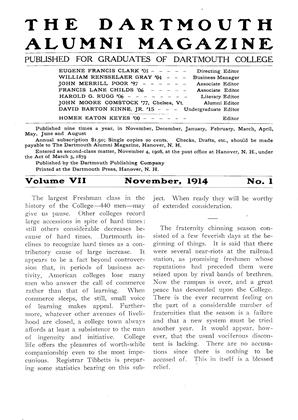It lies only among the things which are possible that a man, to whom it is given to live long, should continue "to live on even terms with time." Judge Cross realized this possibility more nearly than any one whom I ever knew And how kindly and generously he took us all with him into his great partnership with the years. With what easy familiarity he introduced us to the men and events so near to him, but otherwise so. far out of our reach. With what easy familiarity he came into our lives to stir our loyalties and en thusiasms.
"The oldest living graduate holds one of the conventional places of honor in academic life. He is clothed for the time with institutional dignity. It was a iov to watch the undergraduate discovery, class by class, of Judge Cross the man, in David Cross of 41, the oldest living graduate. True he took the initiative. He might have appropriated to himself Dean Stanleys bold adaptation, before a body of students m this country, of Wordsworth's lines on a rainbow in the sky -
"My heart leaps up when I behold'' (An undergraduate)
"So be it when I shall grow old, Or let me die."
But" what undergraduate could resist his approach, so hearty and unaffected, so joyous, so instinct with understand ing, so quick with humor, so often charged with eloquence, and always glowing with sympathy and brotherly love. It was this true, sincere, great- hearted man who made his way year after year to the very end into the hearts of Dartmouth undergraduates. To know Judge Cross became a part of the social training of the classes of the last decade. To have known him will remain one of their happy distinctions.
There were certain things about Judge Cross which older men, his old-time friends and professional associates, could appreciate better than younger men. All of us took delight in his optimism and enthusiasm, but to some of us his greatest charm was his freedom from all artifices, from all affectation and vanity. He kept himself absolutely free from those sins of the mind which lurk in the path of many men for their unhappiness if not for their undoing - suspicion, distrust, envy, and malice. And yet he was no easy critic of public men or of public measures. His sense of justice was acute. There was no weakness in his tolerance. Much as he loved his friends, they could not warp his judgment, much less affect his loyalties. It was good to be assured m this personal way that openmindedness, tolerance, and charity may have constant exercise without the slightest concession or compromise. It was good to see that the virtues after which so many of us strive with but indifferent success could become the habit of a man's life.
Judge Cross will hold a unique place among the honorable men of the College and the State. I think that traditions will gather about his name, and that they will be such as will interpret him aright to other generations for they will grow out of the hearts of those who remembered him.
 View Full Issue
View Full Issue
More From This Issue
-
 Article
ArticleADDRESS DELIVERED AT THE FUNERAL OF JUDGE CROSS OCTOBER 5, 1914
November 1914 By Ernest Fox Nichols -
 Article
ArticleADDRESS DELIVERED AT THE OPENING OF COLLEGE – SEPTEMBER 24, 1914
November 1914 By Ernest Fox Nichols -
 Class Notes
Class NotesLOCAL ASSOCIATIONS
November 1914 -
 Class Notes
Class NotesCLASS OF 1841
November 1914 -
 Article
ArticleA NATION-WIDE DARTMOUTH NIGHT
November 1914 -
 Article
ArticleThe largest Freshman class in the history of the College
November 1914
William Jewett Tucker
Article
-
 Article
ArticleDARTMOUTH MEN IN POLITICS
January 1917 -
 Article
ArticleAS J. W. J. SEES LIFE
June 1936 -
 Article
ArticleTwo Dartmouth Climbers In Dhaulagiri Attempt
MAY 1969 -
 Article
ArticleNOMINATING COMMITTEE APPOINTED
May, 1924 By A. M. Lyon '94, E. F. Clark '01, S. S. Larmon '14 -
 Article
ArticleAbout Twenty-Five Years Ago
December 1934 By Hap Hinman '10 -
 Article
ArticleA Preacher Against War
MARCH 1966 By WARNER B. STURTEVANT '17



